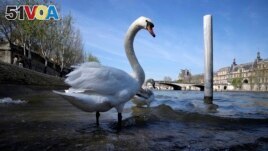14 April 2023
The Seine River, the famous river that goes through Paris, has mostly been off-limits to swimmers since 1923.
Although it has been the subject of art, books, and songs, the Seine was too toxic or poisonous for most fish and for people.
Now, however, its green-brown waters are showing a rebirth.

FILE - Swans stand in the River Seine in Paris, Wednesday, April 5, 2023. (AP Photo/Christophe Ena)
French triathlete Thibaut Rigaudeau is already getting questions about his plans to swim in the Seine. "Are you scared of swimming in the Seine?" He said friends asked him. "It looks disgusting.'"
A costly and complex cleanup is bringing back the Seine just in time for the 2024 Paris Olympics.
Dan Angelescu is a scientist who is tracking the Seine's water quality for the city. He said the cleanup project "will create waves...across the world because a lot of cities are watching Paris."
Angelescu added, "It's the beginning of a movement...We hope so, at least."
The Olympic plans have sped up a cleanup effort that has taken many years. Without having to be ready for thousands of Olympians and Paralympians next year, city officials said it would have taken much longer to pay for the $1.5 billion effort.
The Seine is going to be the center of Paris' Olympic opening ceremony. For the first time, the ceremony will take place not in a stadium but along the sides of the river.
So, the river needs to be ready. Officials have barred homes upstream of Paris and houseboats on the Seine from emptying their waste directly into the river. An Olympic law passed in 2018 gave moored boats two years to connect to Paris' sewerage system. Sewage treatment plants on the Seine and the Marne rivers are also being improved. The Marne River flows into the Seine and is its tributary.
Paris officials say the water quality is already getting better.
There are now more kinds of fish. Years ago, only two or three kinds were able to survive in the dirty water.
Officials say samples taken daily last July and August in the part of the river where Olympians and Paralympians will compete showed the water quality was "good."
Swimming will be starting at the Seine's Alexandre III Bridge. Triathlon competitors will be the first. Men will race on July 30, followed by women the next day. Then come marathon swimmers, on August 8 and 9, and para-triathletes on September 1 and 2.
Rigaudeau competed in para-triathlon at the 2021 Tokyo games. He is looking forward to the events. He is hoping for an early taste of the experience when Paris holds swims in the Seine this summer to get ready for 2024. It will be Rigaudeau's first-ever swim in his home river.
"We will be the ‘testers,'" he said. "I hope we don't get sick."
The river should then reopen to everyone in the summer of 2025. City officials said five possible bathing spots are being studied within Paris itself, with others farther away.
Officials hope Parisians will start to feel that it is safe to go back in the water when they see Olympians and Paralympians leading the way.
I'm John Russell.
John Leicester reported on this story for the Associated Press. John Russell adapted it for VOA Learning English.
__________________________________________________________________________
Words in This Story
triathlete – n. a person who takes place in a long-distance race that has three parts (such as swimming, bicycling, and running) called a triathlon
disgusting – adj. so unpleasant to see, smell, taste, consider, that you feel slightly sick
stadium – n. a very large usually roofless building that has a large open area surrounded by many rows of seats and that is used for sports events, concerts
moor – v. to hold (a boat or ship) in place with ropes
sewerage – n. the system of pipes that carry away human waste, wastewater (sewage) and runoff water to places where they can be treated
sample – n. a small amount of something that gives you information about the thing it was taken from